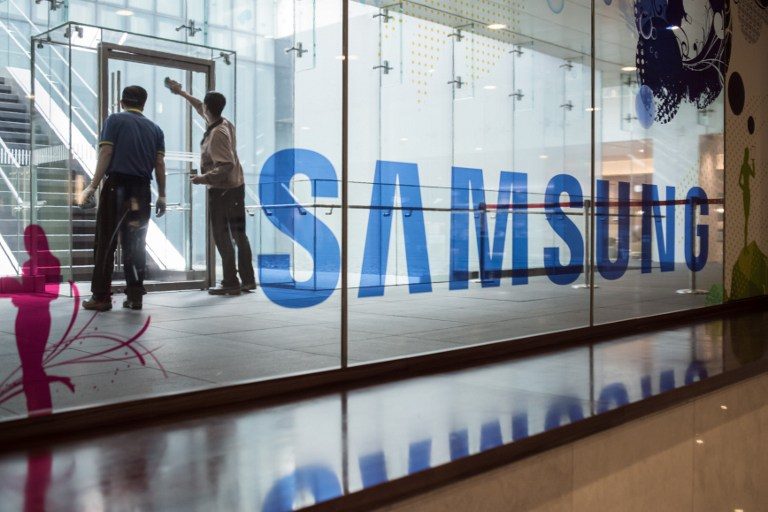SUMMARY
This is AI generated summarization, which may have errors. For context, always refer to the full article.

SEOUL, South Korea (UPDATED) – Samsung heir apparent J.Y. Lee took a major step towards control of the family-run conglomerate on Thursday, October 27, joining the board as the company reported a 30% profit plunge following a highly damaging recall crisis.
The move is being seen as a coronation of sorts of the 48-year-old Lee, who is already vice chairman of Samsung Electronics and has seen his influence grow since his father, Samsung patriarch Lee Kun-hee, suffered a heart attack and was hospitalized in 2014.
“Mr. Lee’s election to the board will allow him to more actively participate in and take formal responsibility for the company’s important decision making, contributing to creating long-term, sustainable value for all of our stakeholders,” board chairman Kwon Oh-Hyun said.
The nomination was approved by an extraordinary meeting of Samsung shareholders which also focused on the recall fiasco surrounding the flagship Galaxy Note 7 smartphone that has hammered the reputation of the world’s largest smartphone maker.
The meeting began just hours after Samsung announced a third quarter operating profit of 5.2 trillion won ($4.6 billion) – down from 7.3 trillion won a year ago.
The profit slump was in line with a revised earning estimate issued by Samsung two weeks earlier after it killed off its Note 7 smartphone due to devices overheating and bursting into flames.
Brand hit
The decision to discontinue production of a model aimed at competing with arch-rival Apple’s iPhone was a devastating move for a company that prides itself on the quality production of cutting-edge technology.
Scrapping the Note 7 saw earnings of the company’s core mobile business drop off a cliff, with the mobile division’s operating profit for the third quarter down almost 98 percent from the previous quarter at just 100 billion won.
In an earnings statement, Samsung said its mobile unit would focus on “expanding sales of new flagship products … as well as regaining consumers’ confidence.”
The impact of the Note 7 debacle on the electronics giant’s brand name is still being calculated, with Samsung itself having predicted another $3 billion-plus in lost profits over the next two quarters.
“The mobile business hit bottom, but it should pull off a partial recovery in the fourth quarter where we will be looking for an operating profit of roughly 2.0 trillion won,” said Greg Roh, an analyst at HMC Investment Securities.
“But we’ll have to wait until the second quarter of next year for a full recovery with the launch of the Galaxy 8 smartphone in March,” Roh said.
Consumer confidence
“Samsung has lost consumer confidence, but I think it still has at least one more chance. Rather than rushing to release the next product, it should conduct a thorough inspection and explain the results of its investigation into the Note 7,” he added.
As an illustration of the loss of prestige suffered by a company used to being treated as corporate royalty in South Korea, thousands of domestic Note 7 customers are expected to join a class action lawsuit seeking compensation over the recall fiasco.
And one South Korean investment advisory firm went so far as to recommend shareholders vote on Thursday against J.Y. Lee’s nomination to the board.
The founding Lee family controls the Samsung group companies, with interests that extend into financial services, hotels, biopharmaceuticals and fashion, through a complex network of cross ownership.
Samsung alone accounts for around 17% of South Korea’s GDP and the Note 7 crisis has impacted the national economy, with the Bank of Korea adjusting its overall growth forecast.
Management spotlight
Companies like Samsung are not used to dealing with public scrutiny, or indeed with uppity shareholders – but the handling of the Note 7 recall placed its management style under a very harsh spotlight.
Despite the pall cast over the smartphone division, Samsung’s display and chip businesses – which supply screens and memory chips to TV makers and rival phone brands – has held up well.
“In particular, demand for memory chips saw a remarkable increase, due mainly to high-density, high-performance mobile and server products,” the company said.
Operating profit in the semiconductor division stood at 3.37 trillion won in the third quarter, up 28% from the previous quarter. – Rappler.com
Add a comment
How does this make you feel?
There are no comments yet. Add your comment to start the conversation.